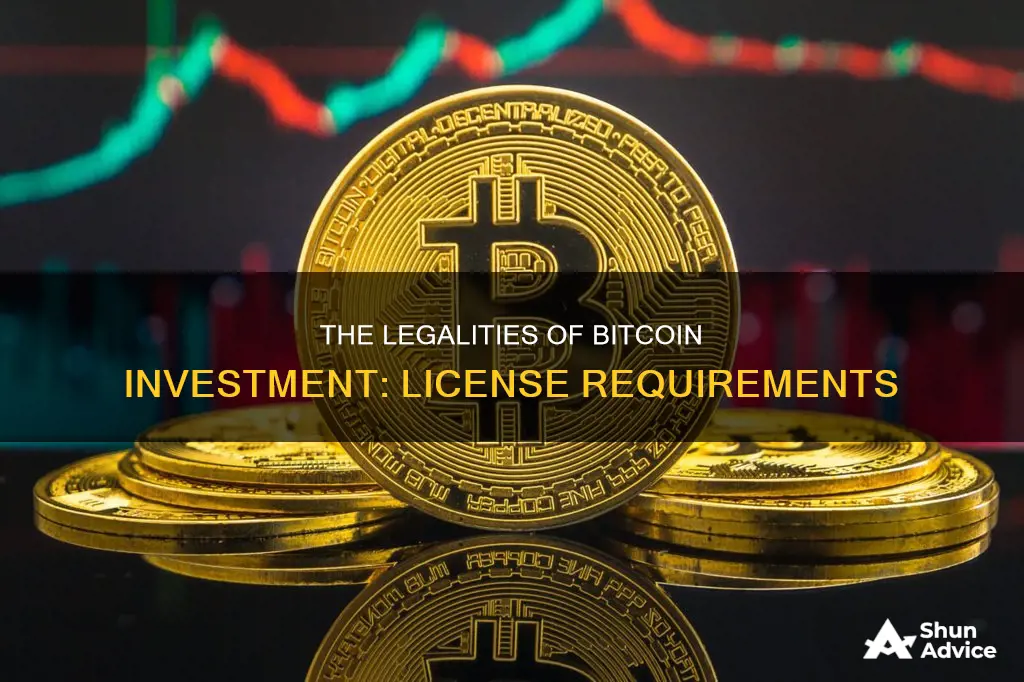
Bitcoin is one of the world's most popular and widely used cryptocurrencies. As such, many people are interested in buying and selling Bitcoin but may be unsure whether they need a license. The short answer is no; you do not need a crypto license to buy and sell Bitcoin as an individual. This is because Bitcoin and other cryptocurrencies are considered decentralized digital currencies, which means that any government or financial institution does not control them. However, there are some exceptions to this rule. For example, if you are buying or selling Bitcoin as part of a business or commercial enterprise, you may need to obtain a crypto license. This is because operating a business that deals in cryptocurrencies can be seen as a form of money transmission, which the government regulates.
| Characteristics | Values |
|---|---|
| Who needs a license? | Businesses that provide services related to cryptocurrencies, such as exchanges, wallets, and financial services that involve cryptocurrencies. |
| When is a license required? | When buying or selling Bitcoin as part of a business or commercial enterprise. |
| Why is a license required? | To comply with relevant laws and regulations, establish customer trust, and expand services. |
| What is a crypto license? | A regulatory document or official permit that allows businesses to trade cryptocurrencies legally. |
| Who issues a crypto license? | Government agencies or regulatory authorities. For example, the Financial Crimes Enforcement Network (FinCEN) in the US. |
| What are the benefits of a crypto license? | Provides access to investors, increases company credibility, ensures compliance with regulations, enables cross-border payments, and safeguards customer funds with the latest security measures. |
| What are the challenges of obtaining a crypto license? | Regulatory complexity, stringent requirements, limited availability of licenses, and high costs. |
| How to obtain a crypto license? | Choose a jurisdiction with a suitable regulatory framework, understand and comply with legal requirements, prepare necessary documentation, and submit an application to the relevant authority. |
What You'll Learn

Crypto licenses for individuals vs businesses
Crypto licenses are generally required for businesses that provide services related to cryptocurrencies, such as exchanges, wallets, and financial services that involve cryptocurrencies. However, individuals can invest in Bitcoin without a license. This is because Bitcoin and other cryptocurrencies are considered decentralized digital currencies, meaning they are not controlled by any government or financial institution.
Crypto Licenses for Individuals
Individuals do not need a crypto license to buy and sell Bitcoin or other cryptocurrencies. However, there are some exceptions. For instance, if an individual is buying or selling large amounts of Bitcoin or other cryptocurrencies, or if they are trading on a P2P platform, they may be subject to regulatory compliance and may need a money transmitter license.
Additionally, individuals who are buying or selling cryptocurrency on behalf of someone else or giving advice about cryptocurrencies may need one or more licenses. These licenses are governed by the Investment Advisors Act of 1940 and enforced by the Securities and Exchange Commission (SEC) and the Financial Industry Regulatory Agency (FINRA).
Crypto Licenses for Businesses
A crypto license is generally required for businesses that provide services related to cryptocurrencies. This includes companies offering trading services, payment processing, and custodial services. The specific type of license required depends on the services offered by the business. For example, a broker license is needed for companies that act as intermediaries in the buying and selling of cryptocurrencies, while a custody license is required for entities that hold and protect digital assets for their clients.
The process of obtaining a crypto license can be complex and typically involves selecting a jurisdiction, registering a legal entity, collecting documents, and submitting an application to the relevant authority. The regulatory requirements for cryptocurrencies vary significantly between jurisdictions, so it is important to understand the specific requirements of each jurisdiction.
Gladiacoin: Principal Returns and Profits
You may want to see also

Regulatory bodies issuing crypto licenses
The regulatory environment for cryptocurrencies is rapidly evolving, with governments and regulatory bodies worldwide taking different approaches to address the innovative capabilities and potential negative impacts of cryptocurrencies. While some countries have implemented comprehensive regulations, others are still in the process of developing their regulatory frameworks. Here is a look at some of the key regulatory bodies and their roles in issuing crypto licenses:
- Financial Crimes Enforcement Network (FinCEN): FinCEN is the regulatory body responsible for issuing crypto licenses in the United States. It considers cryptocurrency exchanges to be money transmitters and has clarified that peer-to-peer (P2P) traders are subject to the same regulatory compliance expectations as exchanges. FinCEN requires crypto businesses to register, implement anti-money laundering (AML) programs, and comply with reporting and record-keeping obligations.
- Securities and Exchange Commission (SEC): The SEC is a market regulator in the United States that has been regulating the cryptocurrency sector. It considers cryptocurrencies to be securities and applies securities laws to digital wallets and exchanges. The SEC has taken legal action against crypto-centric businesses and projects, including lawsuits and complaints against Ripple, Coinbase, and Binance.
- Commodity Futures Trading Commission (CFTC): The CFTC is another regulatory body in the United States that has adopted a more lenient approach to cryptocurrency regulation. It describes Bitcoin as a commodity and allows cryptocurrency derivatives to trade publicly.
- Financial Transactions and Reports Analysis Centre of Canada (FINTRAC): In Canada, crypto exchanges and dealers are required to register with provincial regulators, such as the Canadian Securities Administrators (CSA) and the Investment Industry Regulatory Organization of Canada (IIROC). Additionally, all crypto investment firms are classified as money service businesses (MSBs) and must register with FINTRAC.
- Monetary Authority of Singapore (MAS): In Singapore, crypto exchanges and trading are legal, and MAS is the regulatory body that issues licenses to crypto service providers. MAS has issued warnings about the risks of investing in cryptocurrency products and has prohibited their advertisement to the public. It also requires crypto businesses to obtain an operating license and comply with AML/CFT measures.
- Australian Transaction Reports and Analysis Centre (AUSTRAC): In Australia, crypto exchanges must register with AUSTRAC, identify and verify users, maintain records, and comply with AML/CFT reporting obligations. Unregistered exchanges face criminal charges and financial penalties.
- Financial Services Agency (FSA): In Japan, which has one of the most progressive regulatory climates for cryptocurrencies, the FSA is the regulatory body that crypto exchanges must register with to operate. The FSA has tightened its regulations after a series of high-profile hacks, imposing stricter AML/CFT and cybersecurity requirements.
- Korea Financial Intelligence Unit (KFIU): In South Korea, crypto exchanges and other virtual asset service providers must register with the KFIU, a division of the Financial Services Commission (FSC). The FSC imposes strict reporting obligations on banks with accounts held by crypto exchanges, and all exchanges must comply with AML/CFT regulations.
- European Union (EU): The EU has implemented regulations such as the Fifth and Sixth Anti-Money Laundering Directives (5AMLD and 6AMLD) and the Markets in Crypto-Assets Regulation (MiCA), which tighten reporting requirements and consumer protections. While the EU provides a regulatory framework, individual member states may have their own additional requirements for crypto exchanges, such as registration with their respective regulators.
- Financial Conduct Authority (FCA): In the United Kingdom, which has a measured approach to cryptocurrency regulations, crypto exchanges must register with the FCA and comply with AML/CFT reporting obligations. The FCA's guidance stresses the importance of complying with money laundering and terrorist financing regulations.
- Swiss Federal Tax Administration (SFTA): In Switzerland, which has a progressive stance on cryptocurrency regulations, the SFTA considers cryptocurrencies to be assets subject to the Swiss wealth tax. Crypto exchanges must obtain a license from the Swiss Financial Market Supervisory Authority (FINMA) to operate.
These regulatory bodies play a crucial role in overseeing the crypto industry, ensuring compliance with financial regulations, and protecting consumers and investors. As the cryptocurrency landscape continues to evolve, regulatory bodies will likely adapt and introduce new measures to address the challenges and opportunities presented by this innovative sector.
Strategies for Choosing the Right Crypto Coin
You may want to see also

Crypto license requirements in the US
In the US, cryptocurrency is considered decentralised and operates in the same way as a fiat currency. This means that exchanges and other organisations are obliged to register as Money Services Businesses (MSBs) and receive licences for their activities. The Financial Crimes Enforcement Network (FinCEN) is responsible for issuing these crypto licences.
The licence is a regulatory document that allows businesses to trade cryptocurrencies legally. It is not required for individuals buying or selling Bitcoin for personal use, but it is necessary for businesses or commercial enterprises dealing with cryptocurrencies, as this activity is considered a form of money transmission, which is heavily regulated by the government.
To obtain a crypto licence in the US, businesses must:
- Pass the registration procedure in the US Department of the Treasury, which must be extended every two years.
- Provide a list of their agents.
- Notify authorities about suspicious transactions.
- Comply with Anti-Money Laundering (AML) and Counter-Terrorism Financing (CTF) policies.
- Report transactions exceeding $10,000.
- Maintain records of money transfers and currency exchange.
- Comply with rules on transferring funds.
The cost of obtaining a crypto licence in the US can be substantial, with a government fee of $176,226, plus an annual fee of $136,855. There may also be additional expenses related to legal counsel, compliance officers, technology solutions, and ongoing compliance costs.
It is important to note that the regulatory requirements for cryptocurrencies can vary across different states in the US, so businesses must carefully review the laws and regulations in their specific state or consult with a legal professional.
The Crypto Investment Guide: Getting Started
You may want to see also

Crypto licenses in Europe
The European Parliament approved the Markets in Crypto-Assets Regulation (MiCA) on April 20, 2023, which is a regulatory framework developed by the European Commission to regulate markets for crypto assets and related services that are not currently covered by EU regulations. MiCA is expected to become effective sometime between mid-2024 and early 2025.
The adoption of MiCA will directly affect the regulation of any company that wants to operate in the EU, even if it seeks customers outside the EU. However, the specific requirements for obtaining a crypto license vary across Europe. Here is a breakdown of the requirements and advantages of obtaining a crypto license in several European countries:
- Lithuania: Lithuania is widely recognized for its business-friendly environment and favorable taxation system for crypto businesses. The Lithuanian government actively supports the fintech industry, offering simplified regulation and support for innovation. The Lithuanian crypto license allows companies to provide cryptocurrency exchange services and crypto wallet services. The Lithuanian crypto license can be obtained in 2-4 weeks and costs 3000 EUR.
- Czech Republic: The Czech Republic has a positive attitude towards cryptocurrencies and blockchain technologies, offering one of the most loyal tax systems in Europe for crypto projects. The country offers a simplified process for obtaining a crypto license and has a stable economy and a high level of investment protection. The Czech crypto license can be obtained in 2-3 weeks and costs 1500 EUR.
- Estonia: Estonia was the first country to introduce crypto licensing and is a global leader in digital innovation. The Estonian crypto license requires a physical office in the country and an AML specialist. Estonia has several advantages for crypto licenses, including the ability to work in all EU countries and low taxes. The Estonian crypto license can be obtained in 8-12 weeks and costs 5000 EUR.
- Poland: Poland is located at the heart of Europe and provides a well-regulated crypto industry. Poland has quite low requirements for obtaining a crypto license and there is no requirement for a physical office. The Polish crypto license can be obtained in 4-6 weeks and costs 5500 EUR.
- Slovakia: Slovakia offers a supportive legal framework and a stable business environment for crypto ventures. Slovakia has relatively low corporate income tax, ranging from 19% to 25%. The Slovak crypto license can be obtained in 4 weeks and costs 2500 EUR.
These are some of the key considerations for obtaining a crypto license in Europe. The requirements and advantages may vary depending on the specific country and jurisdiction. It is important to carefully research the regulations and procedures of the desired jurisdiction before initiating the process of obtaining a crypto license.
Dogecoin: Long-Term Investment or Just a Meme?
You may want to see also

Benefits of obtaining a crypto license
While individuals do not need a license to buy and sell Bitcoin, businesses that deal in cryptocurrencies are required to obtain a crypto license. This is because operating a business that deals in cryptocurrencies is often considered a form of money transmission, which is heavily regulated by governments.
Legitimacy and Compliance:
A crypto license grants legitimacy to a business in the digital currency market. It demonstrates a commitment to legal and transparent operations, enhancing the company's credibility. Licensed companies are recognized as compliant with Anti-Money Laundering (AML), Counter-Terrorism Financing (CTF), and Know Your Customer (KYC) regulations, which are crucial for operating in international markets and building trust with users, investors, and financial institutions.
Increased Customer Base and Investor Interest:
A crypto license can attract a wider range of customers and investors. Licensed exchanges are seen as more respectable and trustworthy, providing users with confidence in the security of their investments. Institutional investors and high-net-worth individuals are more likely to engage with regulated entities, ensuring the security of their investments.
International Expansion:
Obtaining a crypto license from a credible regulatory authority can facilitate expansion into new jurisdictions. Many countries require exchanges to be licensed to operate within their borders. With the proper legal support and licensing, businesses can offer their services globally, increasing their customer reach and potential revenue.
Banking Relationships:
A crypto license can help establish and maintain banking partnerships. Banks are often hesitant to work with cryptocurrency businesses due to the perceived risks. However, having a license demonstrates credibility and helps secure these crucial relationships, which are essential for the success of any cryptocurrency exchange.
Consumer Protection:
Crypto licenses safeguard customer funds and protect consumers from financial crimes. Licensed businesses must comply with regulations aimed at curbing financial crimes, such as money laundering, and supporting consumer protection efforts. This builds trust and ensures that customer funds are handled securely and in compliance with the latest security measures.
Altcoin Investing Guide for Indians: Getting Started
You may want to see also
Frequently asked questions
No, as an individual, you do not need a license to buy and sell Bitcoin. However, if you are buying or selling Bitcoin as part of a business or commercial enterprise, you may need to obtain a crypto license.
For individual traders using established platforms, a license is typically not necessary. However, the platform you use should be licensed and compliant with the regulatory requirements of the jurisdiction in which it operates.
Yes, operating a crypto exchange typically requires a license. This ensures compliance with relevant laws and regulations, establishes trust with customers, and allows for expansion of services.
Obtaining a crypto license gives companies many advantages. It enhances the credibility of the company, demonstrates a commitment to legal and transparent operations, and allows companies to participate in cross-border payments.







